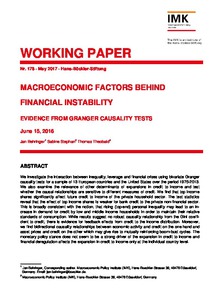Macroeconomic factors behind financial instability. Evidence from Granger causality tests
"We investigate the interaction between inequality, leverage and financial crises using bivariate Granger causality tests for a sample of 13 European countries and the United States over the period 1975-2013. We also examine the relevance of other determinants of expansions in credit to income...
| Main Authors: | , , |
|---|---|
| Institution: | ETUI-European Trade Union Institute |
| Format: | TEXT |
| Language: | English |
| Published: |
Düsseldorf
2017
IMK |
| Subjects: | |
| Online Access: | https://www.labourline.org/KENTIKA-19287850124910050329-Macroeconomic-factors-behind-f.htm |
| _version_ | 1771659893959294976 |
|---|---|
| author | Behringer, Jan Stephan, Sabine Theobald, Thomas |
| author_facet | Behringer, Jan Stephan, Sabine Theobald, Thomas |
| collection | Library items |
| description | "We investigate the interaction between inequality, leverage and financial crises using bivariate Granger causality tests for a sample of 13 European countries and the United States over the period 1975-2013. We also examine the relevance of other determinants of expansions in credit to income and test whether the causal relationships are sensitive to different measures of credit. We find that top income shares significantly affect future credit to income of the private household sector. The test statistics reveal that the effect of top income shares is weaker for bank credit to the private non-financial sector. This is broadly consistent with the notion, that rising (top-end) personal inequality may lead to an increase in demand for credit by low and middle income households in order to maintain their relative standards of consumption. While results suggest no robust causality relationship from the Gini coefficient to credit, there is evidence for feedback effects from credit to the income distribution. Moreover, we find bidirectional causality relationships between economic activity and credit on the one hand and asset prices and credit on the other which may give rise to mutually reinforcing boom-bust cycles. The monetary policy stance does not seem to be a strong driver of the expansion in credit to income and financial deregulation affects the expansion in credit to income only at the individual country level." |
| format | TEXT |
| geographic | EU countries USA |
| id | 19287850124910050329_c2922a56ab344fd2bff6f2dcdf20e1c8 |
| institution | ETUI-European Trade Union Institute |
| is_hierarchy_id | 19287850124910050329_c2922a56ab344fd2bff6f2dcdf20e1c8 |
| is_hierarchy_title | Macroeconomic factors behind financial instability. Evidence from Granger causality tests |
| language | English |
| physical | 30 p. Digital |
| publishDate | 2017 |
| publisher | Düsseldorf IMK |
| spellingShingle | Behringer, Jan Stephan, Sabine Theobald, Thomas economic recession income distribution social inequality Macroeconomic factors behind financial instability. Evidence from Granger causality tests |
| thumbnail | https://www.labourline.org/Image_prev.jpg?Archive=128079194625 |
| title | Macroeconomic factors behind financial instability. Evidence from Granger causality tests |
| topic | economic recession income distribution social inequality |
| url | https://www.labourline.org/KENTIKA-19287850124910050329-Macroeconomic-factors-behind-f.htm |

